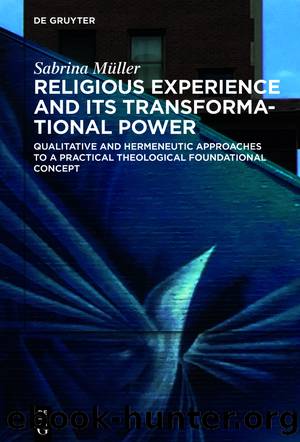Religious Experience and Its Transformational Power by Sabrina Müller

Author:Sabrina Müller
Language: eng
Format: epub
Publisher: De Gruyter
Published: 2023-07-14T05:19:52.120000+00:00
8
Interpretation of the results within the horizon of the initial questions
What is the connection between know-how and other kinds
of knowledge, between knowledge and action, and between
practical knowing and the kind of knowing necessary for
knowing God? We need to learn more about how people
embody knowledge and effect change. That is, we need to know
more about the connections between knowledge, practice,
action, application, and transformation.562
Bonnie Miller-McLemore's desideratum to learn more about the transformative processes of religious knowledge stands at the beginning of this chapter. The discussion that now follows in this chapter must be seen within the horizon of this desideratum. The aim is to reflect on religiously conditioned transformation based on qualitative data and inductive processes.
The analysis made apparent what was already indicated in the sensitizing concepts: Religious experience is a dense and complex phenomenon. This is not only because religious experience cannot be observed but because it is related in numerous ways and has to do with anthropological change processes. It should be emphasized once again that the processual character of religious experience was always at the centre of the analysis, e.g., between recognizing and being recognized or between verifying, interpreting, and making sure of one's faith. This processual dynamic also reflects the individual search for an interpretation of one's own life in the light of Christian perspectives of hope.563
In chapter 8, this transformation logic is now discussed in practical theological terms against the background of the core category of change in the frame of reference and the research question from the first chapter.564 For this purpose, the guiding questions are unfolded in three parts after a preliminary methodological remark and in close discussion with the analysis: In the first part, I make fundamental practical theological anthropological reflections on the understanding of religious experiences and the concept of religion. In the second part, I explore the question of the cognitive quality of religious experience. In the third part, I discuss the processual and transformative aspects of such experiences for individual life.
In all three parts, systematic and practical theological considerations are made concerning the analysis, and the three thematic horizons are accordingly discussed, classified, and findings are presented. Already in the analysis and now also in these sub-chapters, the discourses are intertwined; therefore, they flow together repeatedly in these chapters and are not treated separately.
Download
This site does not store any files on its server. We only index and link to content provided by other sites. Please contact the content providers to delete copyright contents if any and email us, we'll remove relevant links or contents immediately.
Joan of Arc by Mary Gordon(4085)
Victory over the Darkness by Neil T. Anderson(2850)
The Gnostic Gospels by Pagels Elaine(2515)
Devil, The by Almond Philip C(2322)
The Nativity by Geza Vermes(2219)
The Psychedelic Gospels: The Secret History of Hallucinogens in Christianity by Jerry B. Brown(2147)
Going Clear: Scientology, Hollywood, and the Prison of Belief by Lawrence Wright(1973)
Going Clear by Lawrence Wright(1958)
A TIME TO KEEP SILENCE by Patrick Leigh Fermor(1893)
Barking to the Choir by Gregory Boyle(1816)
Old Testament History by John H. Sailhamer(1798)
Augustine: Conversions to Confessions by Robin Lane Fox(1764)
A Prophet with Honor by William C. Martin(1714)
A History of the Franks by Gregory of Tours(1710)
The Bible Doesn't Say That by Dr. Joel M. Hoffman(1674)
The Knights Templar by Sean Martin(1647)
by Christianity & Islam(1626)
The Source by James A. Michener(1595)
The Amish by Steven M. Nolt(1559)
